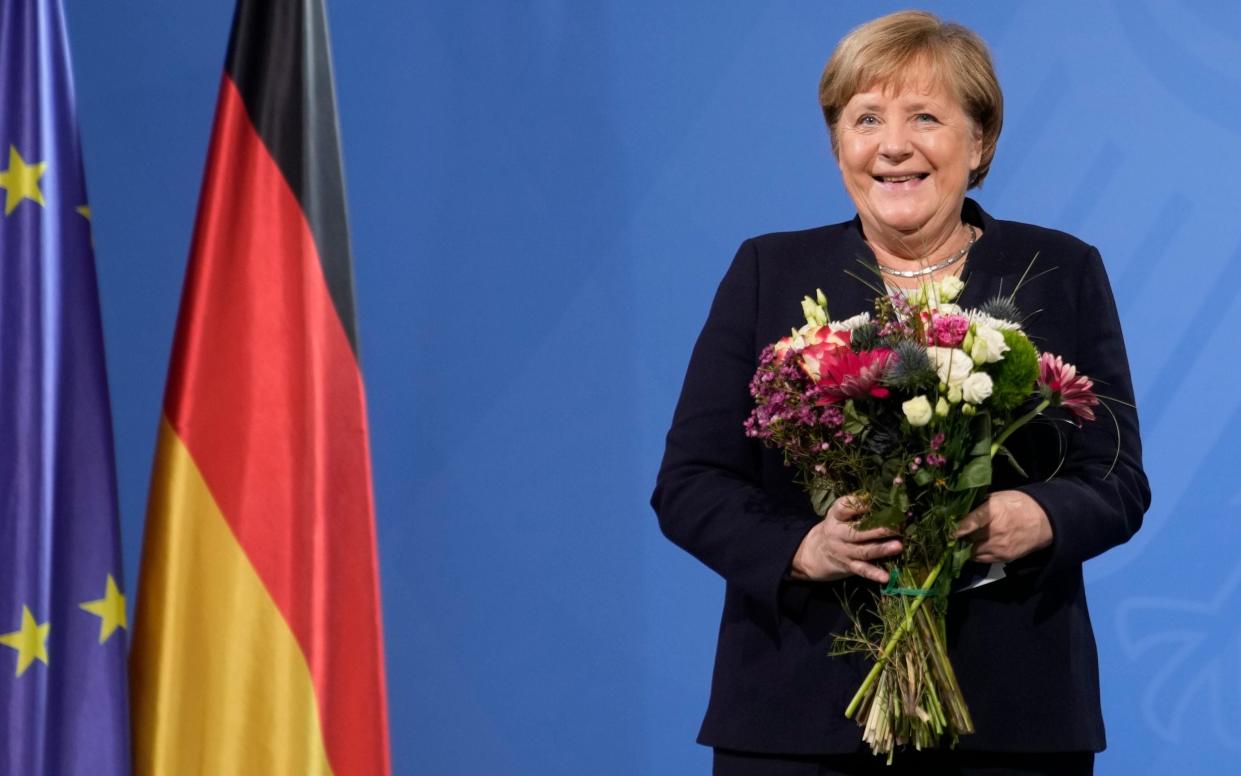Angela Merkel's own party questions her suitability for nation's top honour

Angela Merkel's legacy was criticised by members of her own party amid controversy over the former leader being honoured with Germany's highest order of merit.
Senior figures within the CDU suggested that she wasn't a worthy recipient, with the party's deputy leader, Carsten Linnemann, adding that she had made "grievous errors" during her time in power.
“It is for the German president to decide (whom to give the order to),” Mr Lindemann told a local broadcaster.
“Naturally, she served the country well, but mistakes were made, grievous mistakes,” he said, listing the decision to shut down Germany’s nuclear energy facilities and opening the country's borders to refugees in 2015.
German president Frank-Walter Steinmeier bestowed the Großkreuz in besonderer Ausführung on the former Chancellor at Bellevue Palace in central Berlin on Monday evening.
She is only the third recipient of the award.
Mr Steinmeier said in his eulogy that Ms Merkel was a chancellor of “boundless resilience” whom opponents repeatedly underestimated.
“Those who worked closely with you could never underestimate you,” said Mr Steinemeir, who served as foreign minister in two of her cabinets.
Despite being a member of the Social Democrats, he showered praise on Ms Merkel for “bringing Germany through a series of crises in a position of strength” during her 16 years in power.
Defending her record on negotiating with Russia after the annexation of Crimea, Mr Steinmeier said that: “You always knew how important it was to maintain contact with difficult partners.”
Ms Merkel, 68, became Germany's first ever female chancellor, and the country's first leader from the east, when she was elected in 2005.
Upon receiving the award, Ms Merkel thanked the group of friends and colleagues she had hand-picked to attend for their “unbelievable service and loyalty” during her time in office.
The only other people to have received the award, which is retained for domestic heads of state, are Germany’s first post-war chancellor Konrad Adenauer and Helmut Kohl, both also Christian Democrats.
Germany’s media have noted that current Christian Democrat leader Friedrich Merz was absent from the guest list, even though chancellor Olaf Scholz was invited.

Since the Russian invasion of Ukraine, Germany has radically reviewed its relationship to the woman once called Mutti, as the country’s overreliance on Russian energy and dramatic underinvestment in defence during her chancellorship have been exposed.
The new CDU party leadership have sought to distance themselves from her legacy and move to a more conservative position.
'Her legacy is imploding'
Mr Steinmeier’s decision to award her with the order has exposed the ambivalent attitude to her within the party.
Andreas Rödder, an influential intellectual inside the Christian Democrats, told broadcaster ZFD that she shouldn't have received the award, saying her legacy “is imploding in front of our eyes.”
Merkel's decision to negotiate with Vladimir Putin after 2014 was a "cardinal error... and Germany is now confronted with its shattered remains," said Mr Rödder.
Her style of leadership "promoted a dogmatism in which plurality of opinions was not recognized", he added.
Others have come to her defence, even if in a lukewarm manner.
Armin Laschet, who ran as CDU chancellor candidate in 2021, said that she had held the country together in times of crisis and “that justifies this tribute.”
Ms Merkel grew up as the daughter of a protestant pastor in East Germany, where she learned Russian at school and later studied physics.
She joined the CDU after German reunification and rose quickly up the party ranks where she enjoyed the patronage of Helmut Kohl.
Ms Merkel was elected German chancellor in 2005 and won three subsequent elections before retiring undefeated in 2021.
She is the second-longest serving chancellor after Helmut Kohl.

 Yahoo News
Yahoo News 
